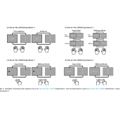Abstract
The confound-minimized cross-task design has been widely used to examine the characteristics of top-down cognitive control underlying the congruency sequence effect (CSE) without feature integration and contin- gency learning confounds. The present study reanalyzed our previous data obtained with the confound- minimized cross-task design, this time including the preceding congruency repetition type, to examine whether the cross-task CSE is confounded by feature integration from two-back (n-2) trials or multiple expec- tancies regarding the congruency and the congruency repetition type of the upcoming trial. As a result, the cross- task CSE interacted with the arbitrariness of S-R mapping or response mode regardless of the preceding con- gruency repetition type, indicating the contribution of top-down control triggered by conflict. Feature integration from n-2 trials, but not multiple expectancies, was found to have a lingering effect on the sequential modulation of the congruency effect between previous and current trials. However, because the influence of feature inte- gration operated in opposite directions depending on the preceding congruency repetition type, the contribution of feature integration to the cross-task CSE can be minimized when the combined datasets of trials following a congruency repetition trial and those following a congruency alternation trial are analyzed. These findings are consistent with recent perspectives on cognitive control, which posit that top-down cognitive control and bottom-up feature integration operate independently to optimize task performance.
